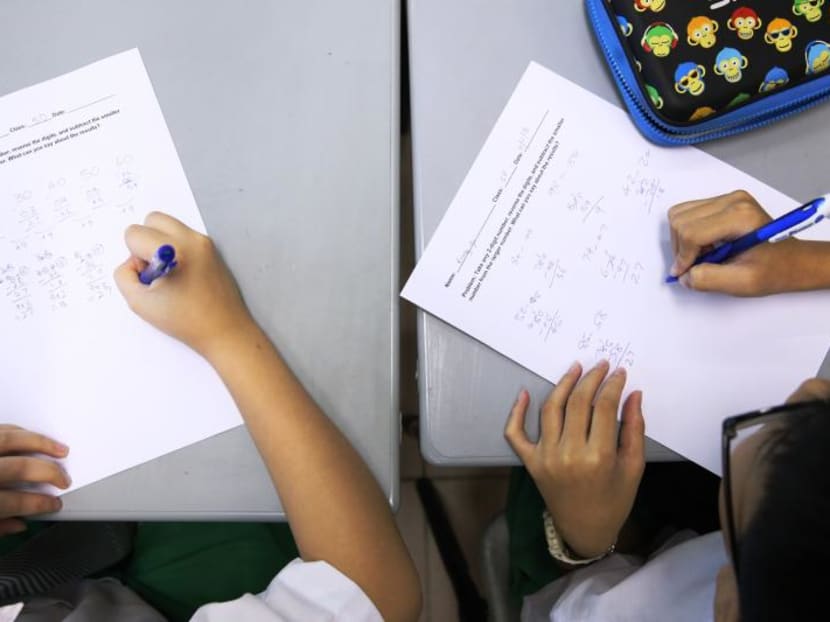PSLE still a necessary checkpoint for students: Study
SINGAPORE — High-stakes exams, such as the Primary School Leaving Examination (PSLE), are still viewed by a majority of parents as a “necessary checkpoint” for their child’s learning progress and a way to gauge their academic aptitude against their peers.

Students filling up a mathematics worksheet in a primary school in Singapore. A July 2017 survey revealed that a majority of parents feel that the primary school curriculum should be made more manageable. TODAY file photo
SINGAPORE — High-stakes exams, such as the Primary School Leaving Examination (PSLE), are still viewed by a majority of parents as a “necessary checkpoint” for their child’s learning progress and a way to gauge their academic aptitude against their peers.
This was revealed in a nationwide study by the Institute of Policy Studies (IPS) that took a quantitative look at the views of 1,500 citizen or permanent resident (PR) parents with children in local primary schools on their perceptions about Singapore’s education system at that level.
When it comes to parents’ perceptions of proposed policy solutions to improve the education system, the study found that less than half of respondents, or 42.5 per cent, agreed or strongly agreed that the PSLE should be pushed back or postponed to a later age.
The remaining 57.5 per cent disagreed or strongly disagreed that high-stakes exams such as the PSLE should be postponed to a later age.
Most parents, or 93.7 per cent, also agreed that the primary school curriculum should be made more manageable, while 87.7 per cent felt that primary school class sizes should be reduced to ensure all students get adequate attention. About two-thirds of parents also agreed or strongly agreed that the amount of homework in primary schools should be reduced.
IPS senior research fellow Dr Mathew Mathews, who led the study, said: “There’s been a lot of talk to postpone exams like PSLE as a policy change, but we soon realised there’s no consensus.”
He told the media during a briefing last week: “For most people, they’re not against the idea of high-stakes exams ... a good proportion of Singaporeans still accept that.”
The issue of whether the PSLE should be abolished had been hotly debated in the last few years.
Back in 2013, Prime Minister Lee Hsien Loong had noted in his National Day Rally speech of the “tremendous stress” that the PSLE had placed on students and families. He said changes to the examination system would “reduce excessive competition to chase that last point”.
In July last year, the Ministry of Education (MOE) announced the biggest revamp to the PSLE, where the “T-score” system will be replaced by eight Achievement Levels (AL) from 2021, where one’s placing is delinked from his peers’ performance.
As for policy changes to make schools more equal across the board, 95.5 per cent of parents strongly agreed or agreed that Government funding should be increased to neighbourhood schools. Over 92 per cent strongly agreed or agreed that the best teachers should be distributed to all primary schools, while 86.1 per cent expressed similar sentiments about standardising learning materials.
Noting how Singaporeans still subscribe to values such as meritocracy and equality of opportunity, the study said: “The findings suggest that parents do support some form of redistribution, and there should be efforts to give children of all backgrounds a fair chance at success.”






